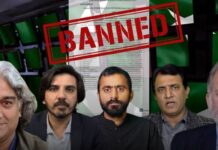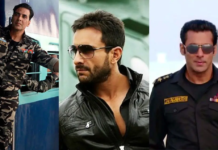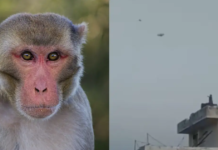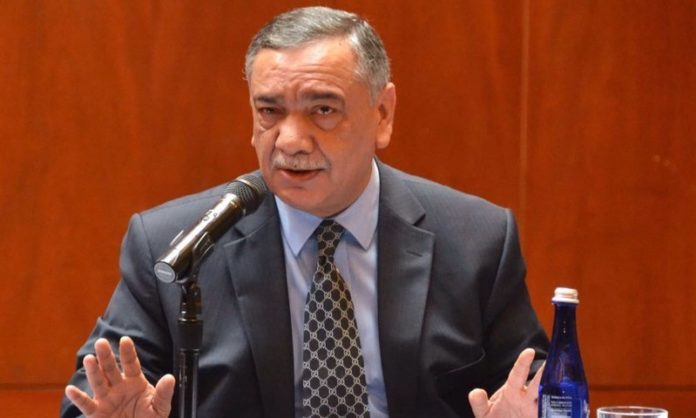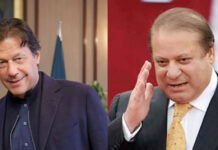The Supreme Court on Wednesday took strong exception to “stage managed” misperception that Chief Justice of Pakistan Asif Saeed Khosa had played any role in the conclusion of Pervez Musharraf’s treason trial by a special court.
In a rather strong reaction, the apex court said the news item that was aired and published by a section of print and electronic media was “baseless, concocted, false, stage managed, out of context and contrary to the facts”.
The news item concerned with an informal meeting of Chief Justice of Pakistan Asif Saeed Khosa with the Press Association of the Supreme Court on Tuesday, the statement said, adding some misleading and out of context news items were aired/published by different TV channels and newspapers without identifying any source.
This created an impression that the CJP was personally involved in the progress of the case before the special court, the statement said.
Apex court statement rejects misleading news item, says Justice Khosa issued no directions to special court that handed down death sentence to Musharraf
The Supreme Court explained that its different benches had been hearing different aspects of the case of former president Pervez Musharraf and had passed different orders for early disposition of the treason trial.
For instance, the petition against the Islamabad High Court judgement, passed on Feb 9, 2015, in the Abdul Hameed Dogar case, was heard and decided in 2016 by a three-judge SC bench comprising then Justice Asif Saeed Khosa, Justice Sardar Tariq Masood and Justice Tariq Pervez.
In that case, the SC passed the order that “the special court is therefore expected to proceed with the trial of respondent No. 2 (Pervez Musharraf) with all convenient dispatch and without any unnecessary delay”.
Similarly, in another civil review petition in the Lahore High Court Bar Association versus Pervez Musharraf, a different three-judge bench comprising the chief justice, Justice Syed Mansoor Ali Shah and Justice Muneeb Akhtar had held that “the special court shall proceed with the trial on the next date of hearing. In case the accused surrenders and appears before the court, he would be entitled to record his statement under Section 342 of the CrPC and lead any other defence under the law. However, in case the accused fails to appear on the next date of hearing, being a proclaimed offender, the special court is empowered to proceed against the accused even in his absence under Section 9 of the Act”.
The statement made it clear that the chief justice of Pakistan had not issued any direction of any sort to the special court other than the judicial directions issued by the relevant benches of the Supreme Court in these cases, which already stand published in the law reports of the country.
“To ensure accuracy in reporting it is expected that this clarification will be aired/published with the same prominence as the earlier incorrect news items were carried,” a statement issued by the Supreme Court said, adding it was expected that accuracy of reporting would be ensured in future.
Meanwhile, at the launch of a research study on “Impact of militancy on administration of justice in former FATA and PATA” held at the Federal Judicial Academy on Wednesday, the Chief Justice of Pakistan highlighted the need for adopting a multi-pronged approach to defeat the scourge of militancy and terrorism.
Enlightening the audience with the history of militancy and terrorism in different countries, the CJP observed that militancy was a form of terrorism and since time immemorial it had existed in one form or another in various parts of the world and civilians had been victims of terror acts.
He said, “We must learn from those countries and nations which defeated terrorists. We need to rethink our strategies to deal with it in a more successful manner.”
The chief justice also read out extracts from a Supreme Court judgement in order to tackle the scourge of militancy and terrorism in an effective manner and quoted a few inspiring lessons from a book titled, “21 Lessons for the 21st Century”, written by Yuval Noah Harari.
About the importance and scope of research culture, CJP Khosa said: “Without research there is no progress, and with no progress there is no learning. It really augurs well that our judicial officers have undertaken research on a very important topic. This research will make them more analytical in their approach.
“Research should always be original. It should always be conducted on the area and also in close contact with the people who are subject matter of the research in question. It should not be academic and bookish.”
Sounding his optimism, the chief justice expressed the hope that this research would enhance the competency and professionalism of the judges who conducted it and a mechanism would be developed to push forward suggestions and recommendations.










